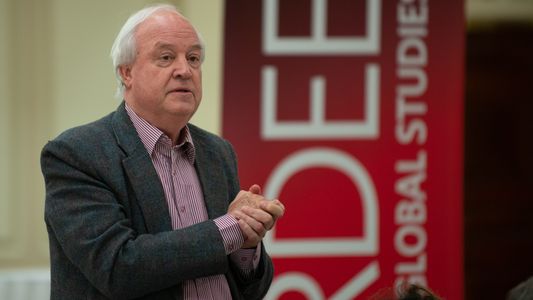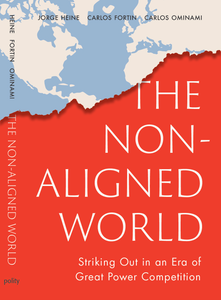Heine Discusses the Relevance of Active Non-Alignment in Global Politics
Pardee Professor Jorge Heine was recently invited to speak about active non-alignment (ANA) on an episode of The China-Global South Podcast. Moderated by journalist Eric Olander and media scholar Dr. Cobus van Staden, the exchange was focused on how ANA, a concept outlined and advocated by Heine, can be practiced by developing countries in the face of U.S-China tensions. The professor’s last two books, The Non-Aligned World: Striking Out in an Era of Great Power Competition (2025) and Latin American Foreign Policies in the New World Order: The Active Non-Alignment Option (2022) provide detailed insights on the subject.

“Active non-alignment is a foreign policy doctrine for developing nations in today’s world for the Global South. It is a guide to action, a compass to navigate the troubled waters. . . . in which the central dynamic continues to be posited by the competition between the United States and China.” — Professor Jorge Heine
ANA argues that developing countries should resist by not aligning with either of the hegemons and instead prioritize their national interests by maintaining neutrality. The podcast talked about Latin American countries like Panama, Colombia, and Chile that are currently caught between the U.S. and China rivalry, and discussed how they can escape unscathed while balancing international and domestic relations. For example, Colombia is already defying the States by collaborating with Chinese contractors to develop a metro infrastructure for its capital. Likewise, China has managed to become Chile’s number one trading partner in the last decade and is now joining hands with the Latin American country to build a space observatory in the Atacama Desert in spite of protests by the U.S.

“The notion that these countries sort of should, you know, sit silently while other powers decide, you know, what the future of the world will be and what place they should occupy is quite wrong-headed. . . . The objective is autonomy, to be able to decide our own future. . . .” — Professor Jorge Heine
While Latin America transitions to an active actor from a passive one, Heine said that the region’s leadership has expressed its desire to maintain stable relationships with both the U.S. and China. In a recent joint statement, President Boric of Chile and President Lula of Brazil declared that they want to remain neutral while actively pursuing commercial opportunities with both superpowers.
To watch Prof. Heine’s complete remarks in this podcast, click here.
Jorge Heine is research professor at the Frederick S. Pardee School of Global Studies and an interim director at the Pardee Center for the Study of the Longer-Range Future. An international relations expert and a lawyer, Heine was a former ambassador of Chile to China, India, and South Africa, and also served as a cabinet minister in the Chilean government. A published writer, he has written 18 books and around 100 journal articles and book chapters. To learn more about Prof. Heine’s scholarly pursuits and accomplishments, visit his faculty profile.